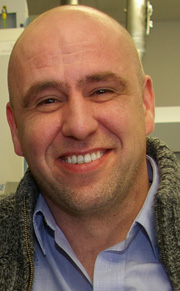The waters off the coast of Sudan are considered a biodiversity hotspot for such critically important marine species as sharks and manta rays, and a pair of UWindsor scientists has laid the groundwork to begin protecting them.

Nigel Hussey. |
Nigel Hussey and Steve Kessel—both post-doctoral fellows in the Great Lakes Institute for Environmental Research lab of professor Aaron Fisk—travelled to the east African nation last fall where they tagged 22 manta rays and installed acoustic monitors in the Dungonab Bay Marine Park and in the offshore reefs along 130 km of Red Sea coastline.
“It’s really the hidden jewel of the Red Sea,” said Dr. Hussey, who will return to the region in several weeks to conduct similar work on hammerhead and grey reef sharks. “Sudan is an area of global importance for the conservation of marine species. It’s nearly pristine, but the situation can change very quickly if commercial fishing takes off there. So we need to be proactive, and preserve the area before that happens.”
Hussey and Kessel—who led the project for The Cousteau Society, the King Abdullah University of Science and Technology and The Deep, a research aquarium located in England, as well as regional partners the Wildlife General Administration and the Red Sea State government—installed acoustic receivers on the ocean floor to record the movements of the tags they surgically implanted in the manta rays. They also attached satellite tags to six manta rays which, along with the acoustic equipment, will provide them with data about their residency and migratory patterns.
“This is the first time this method of tagging has ever been done with manta rays,” Hussey said. “This baseline data will be critical for developing sustainable conservation management plans for them, but also for providing regional capacity-building for marine monitoring and for the economic benefit of local communities.”
Hussey hopes the research will demonstrate the economic value of keeping ray and shark populations at healthy levels. Because of the region’s pristine condition, it’s a highly sought after eco-tourism destination for specialist divers travelling there for up-close experiences with them. If, however, it becomes heavily fished by commercial operators, those populations risk serious decline. Sharks and rays are often inadvertently caught on the lines and in nets used by those fishermen, and are also targeted by illegal fishing activities.
“Manta rays are such beautiful, globally iconic animals, but they’re also highly vulnerable, and are designated as a near-threatened species,” Hussey said. “Populations grow very gradually and are slow to recover once depleted.”
The expert team will return to Sudan twice a year over the next four years to collect data on this important component of marine biodiversity in a region of potential global significance.
“Because certain sharks and ray species are facing global human threats, a success story in the Sudanese Red Sea would offer a ray of hope for our better understanding and protection of these important animals,” Hussey said.
Watch a video clip of Hussey and Kessel tagging a manta ray.




